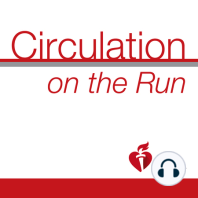17 min listen
Circulation February 21, 2023 Issue
ratings:
Length:
25 minutes
Released:
Feb 20, 2023
Format:
Podcast episode
Description
This week, please join author Amil Shah and Associate Editor Ntobeko Ntusi as they discuss the article "Stages of Valvular Heart Disease Among Older Adults in the Community: The Atherosclerosis Risk in Communities Study." Dr. Carolyn Lam: Welcome to Circulation on the Run, your weekly podcast summary and backstage pass to the journal and its editors. We're your co-hosts. I'm Dr. Carolyn Lam, associate editor from the National Heart Center and Duke National University of Singapore. Dr. Greg Hundley: And I'm Dr. Greg Hundley, associate editor, Director at the Pauley Heart Center at VCU Health in Richmond, Virginia. Carolyn, this week's feature, very interesting. Many times in older individuals we understand how to manage severe valvular heart disease, for example, severe aortic stenosis. But do we really know how to manage individuals with mild valvular heart disease, for example, mild mitral regurgitation or aortic valve sclerosis? Well, our feature today will address that issue. And so, listeners, grab a cup of coffee. We're going to go through some of the other articles in the issue first, and then we'll get to that really interesting, very practical feature discussion. Well Carolyn, now that I've got my cup of coffee, this paper's from your group. And I'm going to ask you, Carolyn, as if it was a feature discussion, what was the background information that went into this and what was the hypothesis that you wanted to address? Dr. Carolyn Lam: Oh, it's great because it's at least not a Carolyn quiz, so I'm very happy to talk to you about it. Sex differences, as you know, it's a passion of mine. And in response to heart failure pharmacotherapies, in particular, we know that there are sex differences, wherein women appear to benefit from newer hormonal modulators across a wider heart failure ejection fraction range compared to men. And this was particularly evident in the Paragon heart failure trial of Arne versus Valsartan. However, whether these considerations also apply to the sodium-glucose Cotransporter 2 inhibitors or SGLT 2 inhibitors, remains unclear. So along with the groups from the DAPA-HF and DELIVER trial, we therefore examine and assess the impact of sex on the efficacy and safety of dapagliflozin in a pre-specified pooled analysis of these trials. Dr. Greg Hundley: Very interesting, Carolyn. So, differences between men and women and evaluation of efficacy of SGLT 2 inhibitors. So what did you find? Dr. Carolyn Lam: In essence, women and men derived similar benefits from dapagliflozin for both the primary outcome of worsening heart failure or cardiovascular death. And for secondary outcomes, including improvement in health status across the full spectrum of ejection fraction in heart failure. Dapagliflozin was also safe and well tolerated in both sexes. So these findings are consistent with other SGLT 2 inhibitors and suggest a class effect. And in fact, this is very, very nicely discussed in an accompanying editorial by Dr. Ileana Piña. Dr. Greg Hundley: Ah, very nice, Carolyn. Well, my first study here comes from the world of preclinical science. And Carolyn, this study assesses the role of epsins in modulating endothelial to mesenchymal transition in atherosclerosis. So Carolyn, you may ask what are epsins? Well, epsins are ubiquitously expressed adapter proteins involved in the regulation of endocytosis. And then Carolyn, there's a second process addressed in this study. And Carolyn, it is known that chronic vascular inflammation, a hallmark of atherosclerosis, induces a process called endothelial to mesenchymal transition. And during endothelial to mesenchymal transition, the transition of non-smooth muscle cell-derived cells that are capable of maintaining indices of atherosclerotic lesion stability are lost. And this allows atherosclerosis to progress to a more advanced stage. So Carolyn, in this study led by Dr. Hong Chen, from Boston Children's Hospital, these authors wanted to know i
Released:
Feb 20, 2023
Format:
Podcast episode
Titles in the series (100)
Circulation January 24, 2017 Issue: Circulation Weekly: Your Weekly Summary & Backstage Pass To The Journal by Circulation on the Run
